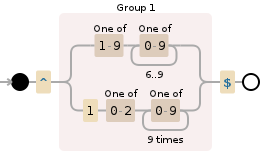I have another question today. I have an email appliance that I am setting up to filter certain data, but it can only do this via regular expression. I have this partially accomplished thanks to this fine gentleman. What I need to accomplish now is something a bit more complex. I should add that I am a complete novice at regex. Right now i'm using this:
(?<!\d)(?!1000000)([1-7]\d{6}|8000000)(?!\d) To find 7 digit integers within a range from 1000001 to 8000000, what i'm looking to do now is find integers between 1000000 and 12000000000, I can re purpose this code by simply changing up the section here
([1-7]\d{6} But from my understanding this would require I format 5 separate expressions to find the data I need (I may be completely off base about this, but I don't know enough about regex to change this line to what I need). I would prefer one expression to look for data between 7-12 digits and stop at certain explicit 12 digit value. How can I accomplish this?
